If these walls could talk.
Waiting inside the small, self-contained conference room in leading criminal lawyer Chris Nyst’s Southport office, you get a sense of what some of his high-profile clients must go through.
After all, he’s the ‘rock star’ solicitor, author and movie maker who has represented the likes of Brenden Abbott (The Postcard Bandit), Pauline Hanson and Bernard Tomic – just to name a few.

The carpet is blood red, and black plush leather armchairs are situated around a glass coffee table.
There’s no windows, only the deep hum of airconditioning that feels like a pressurised airplane cabin.
Proudly on display are framed posters of his books and films – Gone, Cop This!, Gettin’ Square and Crooked Business.
As he enters the room, you notice the sharp suit which hangs on his wiry body. His grey slicked hair, which he has let grow long, frames his charismatic facial features.
He has seen things. Things most wouldn’t understand. A seedy underbelly the public want to read about but keep at a safe arm’s length – away from their tidy, orderly lives.
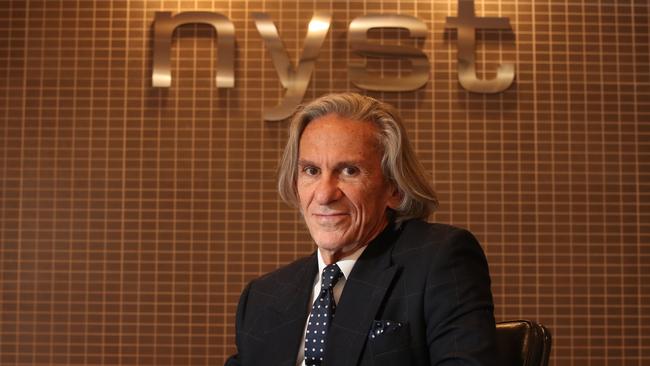
From pre-Fitzgerald Inquiry 1980s Queensland till now, Nyst, 68, is an authority on the legal landscape across the state.
When asked why the Gold Coast has always been a magnet for oddballs, scammers, colourful crooks and larger-than-life personalities – he harkens back to his love of the movies, recalling a western from Hollywood’s golden age.
The film is Boom Town (1940), and stars Clark Gable and Spencer Tracy as two down-on-their-luck oil prospectors looking to strike it rich in a wild frontier town.
And he says the Glitter Strip always has and always will be that very same ‘Boom Town’.
“It’s the place you go to leave your husband, get a boob job, reinvent yourself or make your fortune,” Nyst says.
He calls it “the land of opportunity.”
“In the film, there’s a whole lot of mud and s**t people have to walk around in, girls in saloons and gold in them thar hills. The Coast is really no different. We have to walk around through plenty of s**t, but there’s a whole lot of pretty girls, money to be made and hopes and dreams all around us.”

Nyst says even the criminals on the Coast, for better or worse are, “extremely aspirational people” and “always striving for something greater”.
“People always ask me how I can represent these people (criminals) – the worst of the worst,” he says.
“But what’s interesting is that there’s a little bit of that aspiration in all of us. It just looks a little different.
“In all my years in the game there’s not one person I can think of who was inherently ‘evil’. I’m a believer that people sometimes do monstrous things, but it doesn’t make them monsters.”
GCB: Firstly, a congratulations is in order for your son Jonathan, who was recently awarded Australia’s Top Young Criminal Lawyer. Was law a career you fostered for your sons or did they forge their own path?
CN: Both of my sons (Brendan and Jonathan), came to it in a roundabout fashion. I did encourage it because I believe a legal mind or legal training is very useful for a lot of things in life.

The discipline lawyers learn is drilling down into details. There’s a lot of people in business, commerce and life in general who kind of float around the edges of things and never really quite drill down.
GCB: And did the boys ever say to you I want to be just like you dad?
CN: No they didn’t (laughs). But there’s the old saying ‘every great father is a hero to his son’. So as a father, I think if you’re doing anywhere near a correct job, your children should want to emulate you. I guess one of the things my wife and I both encouraged is to have something to fall back on. You wouldn’t want to adopt anything in the arts without a plan B.
*Both Brendan and Jonathan Nyst work alongside their father at Nyst Legal in Southport on the Gold Coast.
GCB: Given the Gold Coast has its fair-share of colourful crooks and personalities, just how much of your fiction work, the films Gettin’ Square and Crooked Business – as well as the books Cop This!, Gone and Crook as Rookwood are inspired by real life clients and cases?
CN: All of my writing and I think all good fiction is inspired by real life. It’s no secret that my writing is inspired by my career and life.
When I wrote my first book, Cop This!, which was basically a fictionalised journey through pre-Fitzgerald Inquiry Queensland, I had all sorts of people – old cops and journalists and lawyers saying ‘Oh I recognise that character’. But I wouldn’t really know who they were talking about.
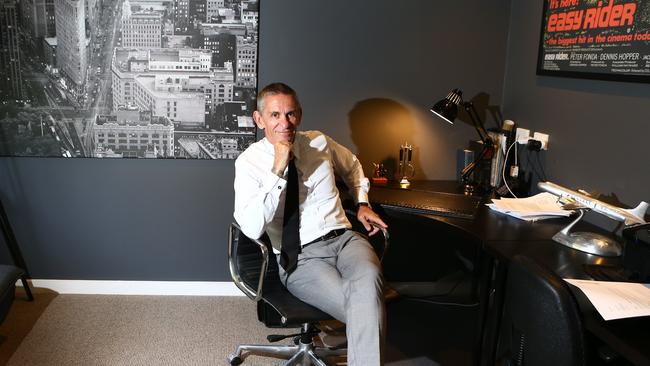
My characters were an amalgam of character types. All of my experiences have informed the stories I have written.
GCB: And arguably one of the most colourful characters ever committed to the silver screen was David Wenham’s Johnny ‘Spit’ Spiteri in Gettin’ Square. Was he inspired by anyone in particular?
CN: He was actually.
GCB: Down to the double pluggers and all?
CN: That was more David’s (Wenham) input. But the first scene I ever wrote for Gettin’ Square was the scene in which he robs a service station with a screwdriver. And that just came from something I had read in the Gold Coast Bulletin – you know – someone holding up a chemist or something with a sharp stick. It struck me as being funny.
The second scene I wrote was the iconic courtroom scene, which came about as pretty much a total lift from something I actually saw.
Essentially it was a scene in which a lifetime junkie was thrown into a hearing, and brought his own rules to the game.
GCB: And just on that, speaking of your fiction work but true crime also, why do you think the public has such a fascination with these kinds of stories and characters?
CN: There’s a couple of factors. Firstly, a lot of ‘so-called criminals’ or the criminal milieu are extremely aspirational people. They might come from struggle street but they want to achieve something or be something.
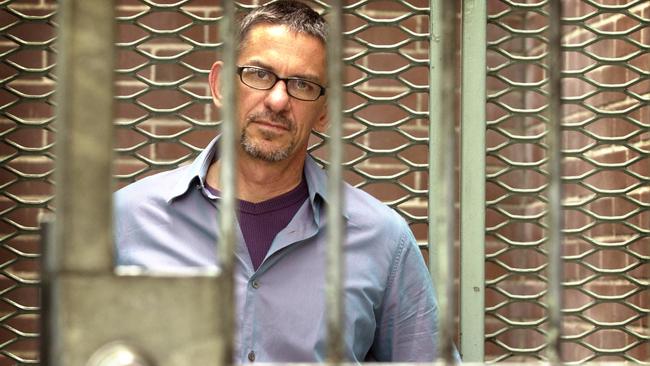
But what’s interesting is that there’s a little bit of that aspiration in all of us. What if I could buy a lotto ticket and get rich overnight? What if I could do this development or what if I could write a book and be famous?
It’s also a world that most of us don’t live in, but we can kind of identify with the people in it. And lastly, it’s just such a foreign world that it’s exciting to immerse yourself in.
GCB: Do you have similar feelings for real-life clients? Is there an affection you have for these down-and-out types?
CN: Generally speaking, It’s been very rare when I haven’t been able to understand why people would do things. I’m a believer that people sometimes do monstrous things, but it doesn’t make them monsters. What they have done is get lost somewhere along the way and taken off their head and put it on a pumpkin (laughs).
But if you dig deep enough into anybody’s life – which in my job you have to do – you can always kind of empathise with them I reckon. In all my years in the game there’s not one person I can think of who was inherently ‘evil’.
GCB: How do you balance finding the time to explore creative endeavours and running the firm? Is there any downtime for Chris Nyst and what does that look like?
CN: (laughs) I love to surf when I can. I’m one of those people who always has lots to do, and if it has to be done I’ll do it.
GCB: What’s your writing process like? Do you lock yourself away in an office?
CN: It depends on where I’m living at the time but I always treat it like a work day. I used to have a property with a little back garden shed and I’d put on my suit and tie and get stuck into the writing there from 7.30 in the morning till 5pm.
GCB: And speaking of your creative output, it was recently reported you were on track to release your newest book since 2009. How is that coming along?
CN: That will be released in a few weeks – and I’ll then follow that up with a couple of others. I can share that I will be finishing my Eddie Moran series (following on from Gone and Crook as Rookwood) with the new book and two more.
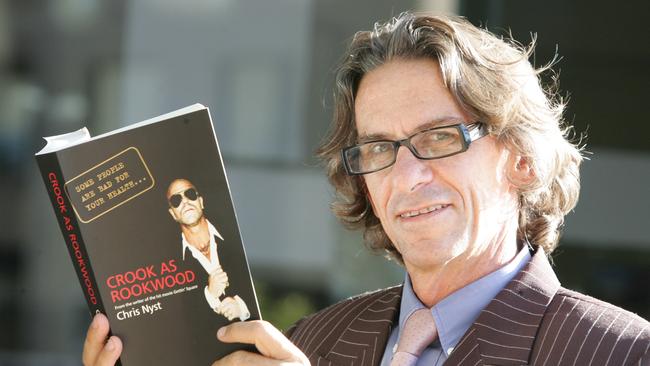
The five books will essentially cover the span of my career from the early 1980s onwards.
GCB: Are you thinking of writing and directing another feature film?
CN: I have written a number of scripts over the years that have been in various stages of development. If you know anything about feature films none of them are very reliable.
But at the moment we are working on a film that may or may not be made.
GCB: Now might be a good time though given how strong our local film industry is, with the recent production Baz Luhrmann’s Elvis and other major productions on the Coast?
CN: Yes, you’re right. This one we are working on is one that should be made next year. We had another that was announced at Cannes Film Festival, but that fell-through.
GCB: You’ve represented an extraordinary line-up of clients over the years, many very high-profile. Can I throw a few names at you and if you could tell readers something they may not know about those cases?
CN: Sure.
GCB: Brenden Abbott (The Postcard Bandit)?
CN: Abbott’s case is one of those ones I have a feeling of unfinished business over. He was convicted in WA of robbery, I think. He then went in to serve a seven-year sentence, and while in prison he was involved in a riot, so they tacked four years onto that. So now he’s a young man facing eleven years.
He then escaped. Now when most people escape they are usually picked up in the first three of four days but he was on the run for six years, which is extraordinary.
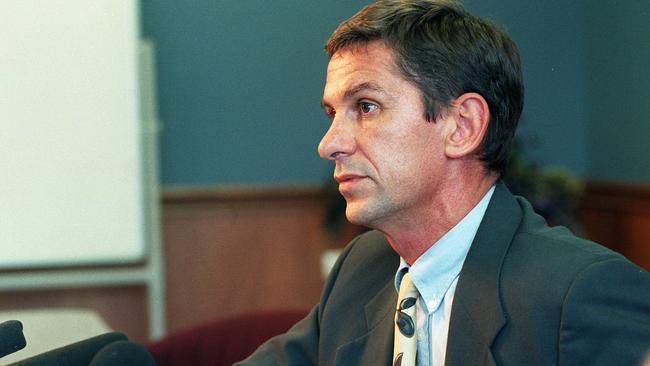
And when you’re on the run, you resort to crime to survive. So by the time he got to Queensland to face court, he was facing a lot more time. It all kind of stacked up and got a bit out of control. To some extent, he was a victim of his own success.
He then escaped from a prison here in Queensland in the lead-up to a state election - and he became a high-profile political football in that election.
There were actually television ads from each of the parties showing his face because he was on the run, and they used him in their tactics to gain votes.
Once he was caught, it was tough on him. He underwent a very strict regime of solitary confinement. People don’t usually have their head around this but I know because I was there. I never knew anybody that spent more than three weeks in the black hole (solitary confinement) at Boggo Road jail. But Abbott spent roughly ten years in confinement there, which is a really sad thing.
GCB: Pauline Hanson? She was found guilty of electoral fraud in 2003 and spent almost three months in jail before three judges overturned her conviction in the Court of Appeal.
CN: Pauline, what can I say about Pauline? (laughs). Pauline’s case is an interesting exercise in human nature because it said a lot about otherwise intelligent people who got carried away with mob mentality.

Hanson was looked down on by the intellectual elite and people saw her as the fish and chip shop owner. People looked their nose at Pauline and it was very fashionable at that time to look down on her.
The terrible thing about it all was that people who ought to have known better got swept away with the whole hysteria.
Hanson should never have been prosecuted for what she was prosecuted for and certainly never should have been convicted for it. There was a number of instances during that time when many people were thinking, this should stop, but it didn’t. It went all the way till she was convicted and went to jail. Finally, the court said – hang on, there’s actually been no offence committed. It makes me worry and it makes me wonder if it was more than just errors committed.
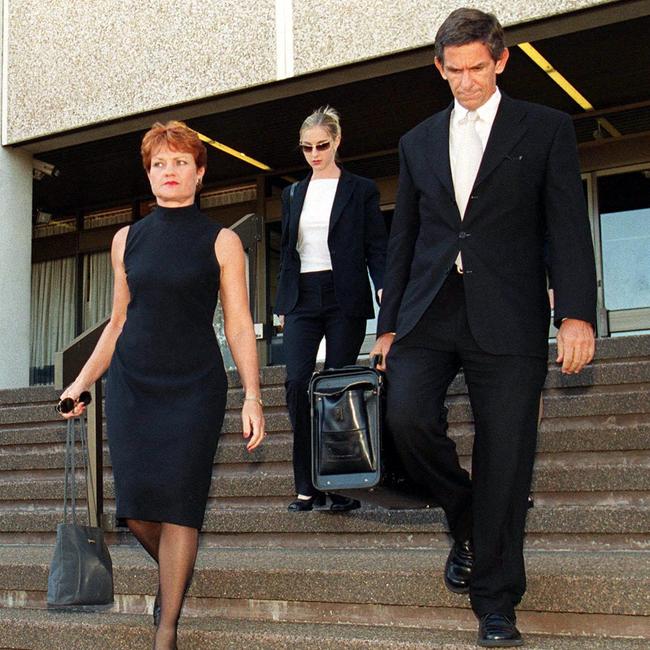
I remember before she was charged, an entertainer walked up to Hanson at a function and threw a glass of wine over her. The media at the time treated it as a bit of a joke but it was an awful thing to do to anybody. I don’t necessarily affiliate with her political views but the whole prosecution was misguided.
GCB: Bernard Tomic and his teen driving dramas? He was fined $1000 for failing to keep left of double lines and two counts of breaching licence conditions. He was placed on a good behaviour bond for failing to stop for police which he explained as a misunderstanding at the time.
CN: I acted for Bernard relatively briefly under quite difficult circumstances for him. He was thrown into some pretty extraordinary circumstances for a kid. He was my own youngest son’s age at the time – in fact they were at school together.

I think when you’re that age you do crazy, silly things but you don’t have to do them under an international spotlight. If I did the things I did and appeared on the front page of every paper I’d probably never want to show my face again. So I think that was tough on Bernard and has probably continued to be for him.
GCB: The Lacey Brothers (Jade and Dionne)?
CN: Look, people can say what they like about the things the Laceys were charged with and convicted of and there were some terrible things amongst it. A young boy died as part of all of that. But again, these were kids who made serious mistakes.
They were convicted of certain offences, did their time and all I can say is I wish them both the very best going forward.
*Jade Lacey was handed a prison sentence over the 2007 death of Kevin Palmer and the torture of drug dealer Owen Matthews, who was forced to dig his own grave on South Stradbroke Island. He was later acquitted of Palmer’s murder, but was found guilty of unlawful wounding with intent. Younger brother Dionne was an accomplice in the killing of Mr Palmer and fired the bullet that killed him. He was convicted of manslaughter.
GCB: And are there any other cases that have really stuck with you over the years?
CN: There are so many cases like that. One example I’ll give you is years ago I acted for a bloke who was in his late 20s who was charged with indecent dealing with a child under 14. And this girl was his wife’s little sister. Now when you look at a case like this you’d immediately say, ‘well, this guy’s a monster, an unredeemable person’.
But this guy, when I talked in conference with him, he could hardly string two words together. He was just a very withdrawn person. I eventually had to dig into his background and found quite a tragic story.
His mother one day was at the stove with his baby sibling, and he was only five or six at the time. She (the mother) caught fire and died, along with the infant – as a result.
So the surviving children were all put in an orphanage and split up. While they were there, he was assaulted and all sorts of terrible things. Basically, the story is he was ripped from a family life and lost all contact with anybody that showed him any kind of love or affection.
He came out the back of that and was put to work on the farms and went into a marriage with a woman. When the psychs got a hold of him they realise he’d never been able to form an emotional bond with anyone until he met his wife’s younger sister.
Now, it’s all tragic in every aspect you look at it. But when I read this guy’s story, I personally just came away thinking you can’t stand in judgment of someone like that.
The reason I raise this is it’s a tiny little instance of when people ask me why I act for these terrible people. You can’t get much more terrible than a kiddie fiddler (sic).
When you peel off the layers and get right down into the essence of these things, you can often find yourself in a situation where you ask ‘who am I to condemn someone like this? I come from a loving family.’
GCB: What’s next for you in a professional capacity? Now that your two sons are in the firm do you ever consider retirement?
CN: I still enjoy what I do. I don’t see too much need to retire, but when I get old and doddery I suppose I’ll consider it (laughs). But the boys are still cracking the whip over me so I just do as I’m told.


Add your comment to this story
To join the conversation, please log in. Don't have an account? Register
Join the conversation, you are commenting as Logout
OPINION: How GC can ‘maximise every opportunity’ ahead of 2032
The Gold Coast must capitalise on early investments in public transport, community venues, new tourism experiences, enhanced tertiary education and leading-edge technology, writes Tom Tate
‘Golden opportunity’: Why this is our most important two years
The Gold Coast faces its most important two years this century - and must extend light rail south of Burleigh and clarify its identity before the 2032 Games, a leading demographer says.